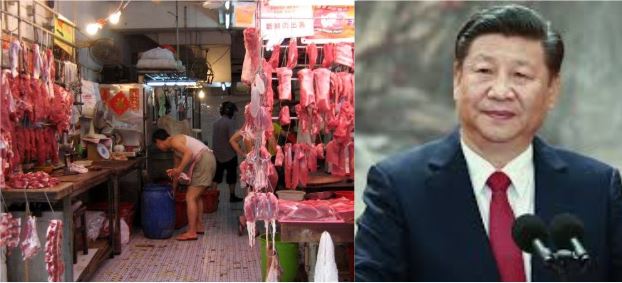As investigation into the origins of Coronavirus has got wide acceptability among the nations of WHO and a thorough inquiry looks inevitable, the Communist government of China has started taking steps to curb the consumption and breeding of exotic wildlife animals, which are believed to be the source of virus that cause ongoing pandemic.
Wuhan, the city from whose wet markets Coronavirus is supposed to have infected humans, has banned breeding and consumption of exotic wildlife animals for the next five years. Earlier the wildlife animals bred on farms for domestic meat consumption was allowed but hunting these animals from jungle was banned. Now, with the ban on farming of these animals in place, the whole ‘wet market’ has been neutralized for the next five years.
Apart from ban in Wuhan, many central provinces which are a major breeding centre of wildlife animals, are offering cash incentives to farmers to discourage wildlife trade.
Hunan, a province in Central China, laid out a compensation scheme to farmers to switch to other livelihoods. As per a report by AFP, “Authorities will evaluate farms and inventories and offer a one-off payment of 120 yuan ($16) per kilogram of rat snake, king ratsnake and cobra, while a kilogram of bamboo rat will fetch 75 yuan.”
Jiangxi, another province in central China, has also laid out a plan to provide financial aid to farmers for disposing current stock and switching to other alternatives to earn living. There are more than 2,300 licensed breeders in the state with stock worth more than 225 million dollars. Therefore, incentivizing the farmers to switch to other alternatives would cost much to Chinese provincial governments as breeding wildlife animals is a lucrative business in the country.
But, if the government in these provinces could convince the breeders to switch to other alternatives, the industry would be hit badly, as both are “major wildlife breeding provinces”.
“In the past 20 years, a lot of people have been telling the Chinese government to buy out certain wildlife breeding operations — for example bear farming,” said Human Society International (HSI) China specialist Peter Li. “This is the first time that the Chinese government actually decided to do it, which opens a precedent… (for when) other production needs to be phased out,” he added.
Although more than one provincial governments in China have taken steps to discourage wildlife farming (at least on paper), but these actions could not be evaluated on the face value. It is possible that China is bluffing the world to pass the investigation by global authorities and once it is over, the government might reopen it.
As per a report by World Economic Forum, wildlife-farming industry has annual revenue of more than 74 billion dollars- almost double of India’s Media and Entertainment industry- in China and a large number of people are employed in this. Putting a ban on eating wildlife food means millions of more unemployed people in an already distressed economy which China cannot afford, and therefore, these decisions by provincial government needs to be taken with pinch of salt.
Moreover, consumption of wildlife animals is an integral part of China’s dietary habits. Ban on sales means interfering with daily lives of the people, which is toughest for any government to do, even if it is Communist government. But if despite all these hurdles, Chinese government is ready to ‘force’ people to quit consumption of wildlife animals; that is a step in right direction, at least for the people in other parts of the world.


























